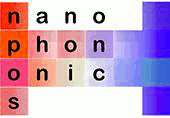
Nanophononics is defined as the control of heat transport in the nanoscale. This kind of control would improve existing electronic devices, as well as lead to completely new applications in the fields of nano machines, electronics, refrigeration, energy transport and energy generation [1]. It has been suggested that similar devices as those used for electronics can be developed for the control of phonon flows [2]. The promise of phononics can bring changes as dramatic as the ones brought by electronics.
There are many important challenges that have to be overcome: experimental, computational and theoretical. Phonons do not have charge or mass, and are not conserved particles. This makes their experimental characterization and control very difficult. There are also many theoretical challenges, as we lack a fundamental understanding of thermodynamics at the nanoscale. Thus, many fundamental questions arise in this context: What is the appropriate definition of temperature here? What is the role of quantum effects in nanoscale heat transport? How do these questions affect experiments? How should nanophononic devices be designed? What materials are better suited for these devices? These are some of the fundamental unanswered questions. There are major computational challenges as well. First, the computational modeling of the experiments is very difficult due to the scale of these materials and devices. Also, many of the existing techniques rely on theoretical assumptions with an unreliable foundation and an unclear regime of validity.
This field is reaching a point where, to proceed forwards, more exchange between theory, computational methods and experiments is needed. It is also important to have researchers working on different computational methods to exchange ideas in order to bridge methodological gaps. A workshop that brings all these together will focus the research field, helping to identify challenges and goals. It will also help to define and structure the community.

Nanophononics is defined as the control of heat transport in the nanoscale. This kind of control would improve existing electronic devices, as well as lead to completely new applications in the fields of nano machines, electronics, refrigeration, energy transport and energy generation [1]. It has been suggested that similar devices as those used for electronics can be developed for the control of phonon flows [2]. The promise of phononics can bring changes as dramatic as the ones brought by electronics.
There are many important challenges that have to be overcome: experimental, computational and theoretical. Phonons do not have charge or mass, and are not conserved particles. This makes their experimental characterization and control very difficult. There are also many theoretical challenges, as we lack a fundamental understanding of thermodynamics at the nanoscale. Thus, many fundamental questions arise in this context: What is the appropriate definition of temperature here? What is the role of quantum effects in nanoscale heat transport? How do these questions affect experiments? How should nanophononic devices be designed? What materials are better suited for these devices? These are some of the fundamental unanswered questions. There are major computational challenges as well. First, the computational modeling of the experiments is very difficult due to the scale of these materials and devices. Also, many of the existing techniques rely on theoretical assumptions with an unreliable foundation and an unclear regime of validity.
This field is reaching a point where, to proceed forwards, more exchange between theory, computational methods and experiments is needed. It is also important to have researchers working on different computational methods to exchange ideas in order to bridge methodological gaps. A workshop that brings all these together will focus the research field, helping to identify challenges and goals. It will also help to define and structure the community.